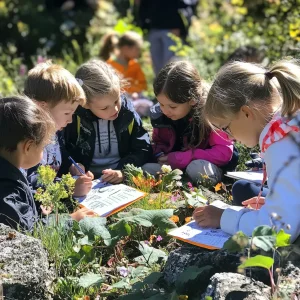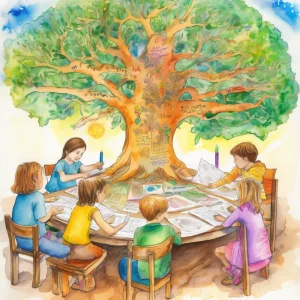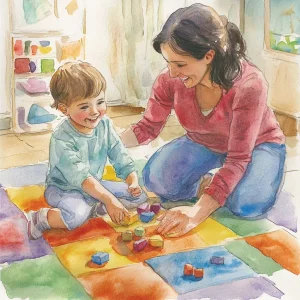Activity
Similar Activities
Symmetry Magic: Reflective Art Adventure
Children’s Age: 7–10 years
Activity Duration: 10 – 25 minutes
This activity involves exploring symmetry through a creative and interactive art project for children aged 7-10 years.
Activity Duration: 10 – 25 minutes
Whispers of the Future: Persuasive Writing Adventure
Children’s Age: 8–11 years
Activity Duration: 10 – 30 minutes
Engaging activity for 8-11-year-olds focusing on persuasive writing, career exploration, and technology experiments.
Activity Duration: 10 – 30 minutes
Bridge Builders: Eco Teamwork and Critical Thinking
Children’s Age: 8–9 years
Activity Duration: 10 – 25 minutes
An eco-conscious activity where children build bridges using popsicle sticks and tape to support toy cars, promoting teamwork and environmental awareness.
Activity Duration: 10 – 25 minutes
Cultural Collage Creations: Exploring World Wonders Together
Children’s Age: 7–9 years
Activity Duration: 10 – 25 minutes
Let's embark on a creative journey with "Cultural Collage Creations"! This educational craft project invites children to explore diverse cultures through art. Gather supplies and c…
Activity Duration: 10 – 25 minutes
Nature Quest: Explore, Learn, and Respect
Children’s Age: 10–15 years
Activity Duration: 0.5 – 1 hours
The Nature Scavenger Hunt activity is designed to help children aged 11 to 15 develop morals, academic abilities, and a love for nature. Prepare by gathering supplies like lists, p…
Activity Duration: 0.5 – 1 hours
Whispers of the Family Tree of Friendship
Children’s Age: 10–12 years
Activity Duration: 20 – 35 minutes
Family Tree of Friendship is a creative activity that helps children enhance communication skills, academic development, and understanding of family and social relationships. Child…
Activity Duration: 20 – 35 minutes
Nature Shapes Adventure: Bird Watch & Scavenger Hunt
Children’s Age: 4–5 years
Activity Duration: 10 minutes
An outdoor activity for children aged 4-5 years combining bird watching and shape recognition.
Activity Duration: 10 minutes
Colorful Objects Sorting Game for Cognitive Development
Children’s Age: 1.5–4 years
Activity Duration: 10 – 15 minutes
This colorful sorting game is designed to boost your child's cognitive skills and nurture their curiosity. Gather safe, colorful objects like blocks or toys from your home. Place t…
Activity Duration: 10 – 15 minutes
Musical Painting Fun: Expressive Art and Melodies
Children’s Age: 2–3 years
Activity Duration: 10 – 30 minutes
This activity involves children creating paintings while listening to music that matches the mood of sentences they choose. It helps with sensory development, and social-emotional …
Activity Duration: 10 – 30 minutes
Ecosystem Adventure Board Game - Nature's Quest
Children’s Age: 7–9 years
Activity Duration: 10 – 25 minutes
An interactive board game where children explore and learn about ecosystems through challenges and tasks.
Activity Duration: 10 – 25 minutes
Cultural Creatures: Stop-Motion Animation Adventure
Children’s Age: 4–9 years
Activity Duration: 10 – 25 minutes
An interactive activity using technology to create stop-motion animations exploring plants and animals from diverse cultures.
Activity Duration: 10 – 25 minutes

























